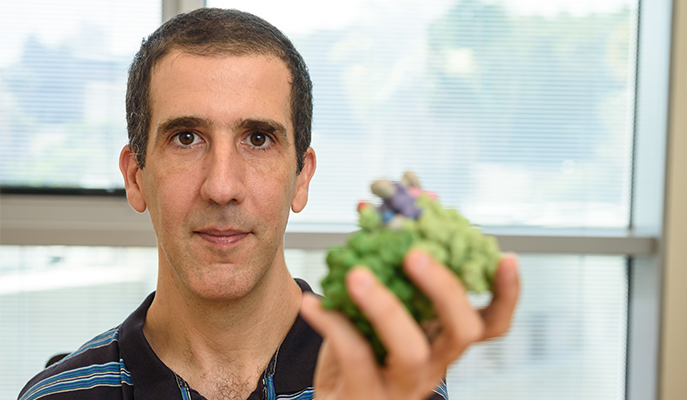Are you a journalist? Please sign up here for our press releases
Subscribe to our monthly newsletter:

Prof. Sarel Fleishman and colleagues of the Weizmann Institute of Science's Biomolecular Sciences Department use a unique research platform that combines the computational design of molecules and laboratory experiments – with the aim of designing tiny antibodies that can slip through the robust coronavirus's defense system. The process involves the design of millions of miniscule synthetic molecules – called nanobodies – and Fleishmann intends to focus on the most promising molecules as potential candidates for new drugs to treat the COVID-19 virus.
Fleishman develops computational models for the rapid design of "customized proteins." His innovative methods serve the global research community through public web servers and have already been adopted by hundreds of laboratories worldwide. The algorithms at the heart of the computational tool are based on the understanding of the ways in which proteins fold in space and exert their functions.
Much of Fleishman's work focuses on antibodies – proteins that defend the body against disease-causing invaders, such as viruses and bacteria. His research has already led to the design of a potential malaria vaccine, and he is now concentrating his efforts on the coronavirus. To do so, the research will concentrate on a particular structural component of the coronavirus – the "Spike protein" – that plays a key role in the infection process. Fleishman aims to design nanobodies that will bind to vulnerable points on the Spike, thus halting the infection process.
The research group will use cloud computation that enables access to millions of computational hours, and they will then conduct experiments to decipher which of the millions of designed antibodies bind tightly to the Spike.
Prof. Sarel-Jacob Fleishman is head of the Dr. Barry Sherman Institute for Medicinal Chemistry; his research is supported by the Yeda-Sela Center for Basic Research; the Schwartz/Reisman Collaborative Science Program; the Edmond de Rothschild Foundations; the Henri Gutwirth Fund for Research; Sam (Ousher) Switzer & Children; the Dianne and Irving Kipnes Foundation, Carolyn Hewitt and Anne Christopoulos, in Memory of Sam Switzer; Darlene Switzer-Foster and Bill Foster; Susan and Michael Stern; Stanley and Ellen Magidson; the Milner Foundation; and the European Research Council.